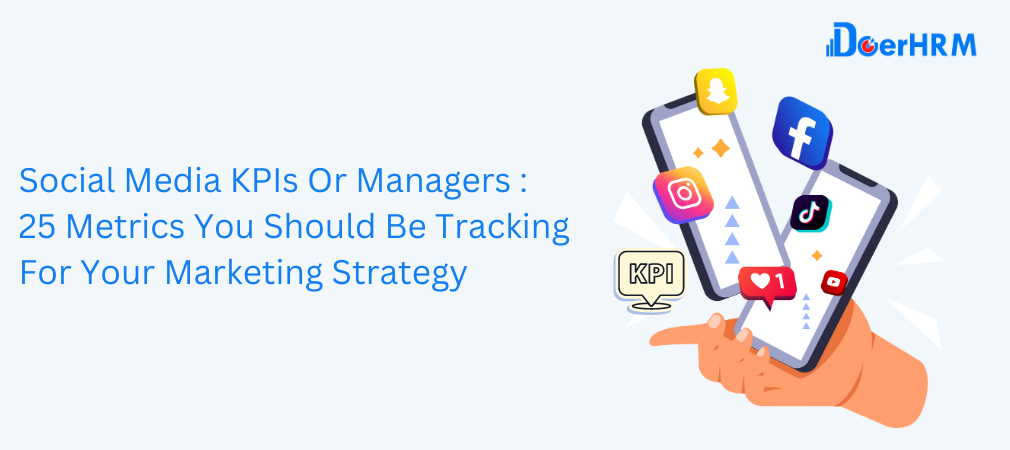Social Media KPIs Or Managers : 22 Metrics You Should Be Tracking For Your Marketing Strategy

Experience the power of seamless HR management with our free trial - sign up now at https://app.doerhrm.com/app/freeregister !
Download our comprehensive guide to KPI and OKR implementation at https://www.doerhrm.com.my/download-online-kpi-okr-guide/ today.
Social media KPIs has become an essential marketing tool for businesses of all sizes. However, it’s not enough to simply post content and hope for the best. To ensure that your social media campaigns are successful, it’s crucial to track key performance indicators (KPIs) that help measure the effectiveness of your efforts.
KPIs are specific metrics that are used to evaluate the success of a particular activity or campaign. In the context of social media marketing, KPIs are used to track and measure the performance of your social media campaigns, including engagement rates, reach, conversions, brand awareness, and customer satisfaction.
By tracking these metrics, managers can gain valuable insights into their social media campaigns, allowing them to make data-driven decisions and optimize their strategies for maximum impact. Social media KPIs help managers understand which posts are resonating with their audience, which social media platforms are driving the most engagement, and which campaigns are generating the highest ROI.
In short, social media KPIs are critical to the success of any social media marketing strategy. Without tracking these metrics, it’s impossible to know whether your campaigns are effective and whether your social media presence is making a positive impact on your business.
In this article, we will explore about the importance of tracking social media KPIs for managers in their marketing strategy. We will define KPIs and their significance in measuring the success of social media campaigns. Additionally, we will cover key social media KPIs for managers, social media platforms, and tools for tracking social media KPIs.
Key Social Media KPIs for Managers
Engagement Metrics
1. Likes, Shares, Comments
Likes, Shares, and Comments are some of the most fundamental engagement metrics for social media campaigns. These metrics measure how users are interacting with a specific post and help managers determine the level of engagement and interest generated by the content.
Likes: Likes are an essential metric that measures the number of users who have clicked the ‘like’ button on a post. Likes are an indication that the content has resonated with the audience, and they are a simple way for users to show their support and approval for a post.
Shares: Shares measure the number of times a post has been shared by users on social media. When a user shares a post, it is typically because they found the content informative, interesting, or entertaining and want to share it with their own network of followers. Shares can help a post reach a larger audience and generate more engagement.
Comments: Comments are a metric that measures the number of user-generated comments on a post. Comments can be a powerful tool for engagement, as they encourage users to participate in a conversation and provide feedback on the content. Managers can use comments to gain insights into their audience’s thoughts, opinions, and preferences, and use this information to optimize their content strategy.
Overall, likes, shares, and comments are essential metrics for managers to track, as they provide a clear indication of how well their content is resonating with their audience. By monitoring these metrics, managers can gain valuable insights into their social media campaigns, make data-driven decisions, and optimize their content strategy for maximum engagement and impact.
2. Retweets, Mentions, Replies
Retweets, Mentions, and Replies are engagement metrics specific to Twitter that help managers understand how their audience is interacting with their content on this platform.
Retweets: Retweets measure the number of times a tweet has been shared by users on Twitter. Retweets are similar to shares on other platforms and indicate that the content is valuable and shareable. Retweets help to amplify the reach of a tweet, allowing it to reach a larger audience.
Mentions: Mentions are a metric that measures the number of times a user has been tagged in a tweet by another user. Mentions are a powerful tool for engagement, as they allow users to interact directly with others and encourage conversation and feedback. Mentions can help to build relationships with customers and other users and increase the visibility and reach of a Twitter account.
Replies: Replies measure the number of user-generated replies to a tweet. Replies can provide valuable feedback and insights into how users are reacting to the content and can help managers gauge sentiment and response. Replies can also help to spark conversation and engagement and can be used to build relationships with customers and followers.
Overall, Retweets, Mentions, and Replies are essential metrics for managers to track on Twitter, as they provide valuable insights into how their audience is interacting with their content. By monitoring these metrics, managers can gain a better understanding of user behavior on Twitter, optimize their content strategy, and improve engagement rates.
Read More at : https://www.doerhrm.com.my/social-media-kpis/
